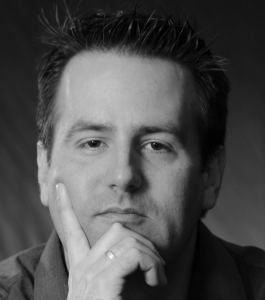Q&A with Gini Koch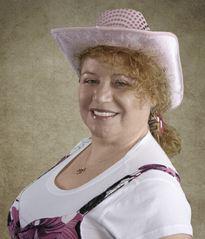
Q: Tell us a little about yourself and your career as an author.
A: I’m a wife, mother, have dogs and cats (the Canine Death Squad and the Killer Kitties), ride horses, and up until a couple of years ago, I worked full time for Corporate America. I wrote for six years before I ever considered trying for publication, and it took four more years to get good enough to BE published. I landed a great agent in December 2007, got a 2-book deal with DAW Books in May 2008, and have been happily writing like mad ever since. I’m published in 6 pen names, so far, in short, mid-length, and novel-length fiction. I write the Alien/Katherine “Kitty” Katt series for DAW Books/Penguin, the Alexander Outland series for Night Shade Books, and a variety of shorter fiction series and stand alones for Musa Publishing.
Q: You have contracts with one of the majors in publishing (DAW Books/Penguin), a smaller house (Night Shade Books), and with an e-only publisher (Musa Publishing). What are the differences?
A: Because I have great editors at all three houses, I’d have to say that speed is probably the biggest difference between them. Ebooks, by their nature, can go up faster than anything else, and smaller presses have less layers to go through, so they tend to move more quickly than Big 6. There are other differences (advances tend to be larger from the Big 6, for example), but I think speed to publication is the difference I notice the most.
Q: What’s it like to work with a NY publishing company?
A: Very cool. There are a lot of advantages to being with the Big 6, including worldwide distribution. There’s a lot of hurry up and wait involved, but you adjust to it. The pros tend to outweigh the cons. Plus I’m with DAW, which is just a fabulous imprint, run by amazing people who love books and authors, so it’s pretty much livin’ the dream when you’re with DAW, and then you add in all the cool Penguin folks and worldwide reach and, I’m not gonna lie, it’s pretty darned great.
Q: What are the reasons you think this is still the best way to publish?
A: In this day and age, coming out in favor of “traditional” publishing feels kind of risky. But you really can’t beat getting an experienced, professional editor, a big name cover artist, and a full sales force selling your book into bookstores all over the world. Traditional publishing means you have gatekeepers. Are they always right? Of course not. Are they right a lot? Absolutely. And the checks and balances of traditional publishing mean that you’ll have a professional product when you’re done, and that really does matter, especially when you’re starting out.
BTW, I consider my epublisher to be a traditional publisher, just as I do with my Big 6 and small press publisher. They do the same things — provide editing, cover art, promotion, support.
Q: Why did you choose to send some of your books under different pen names through smaller publishers?
A: LOL. You make an error in assumption. The publishers choose what they want to publish, not the agents or authors. I write under a variety of pen names. My shorter works are not appropriate to go via Big 6, since they’re not in the business of publishing short stories, novelettes, or novellas all that often. Musa, by way of being an epublisher, was a much more appropriate place to send my shorter stories, regardless of the name I wrote them under. And, Night Shade loved Alexander Outland: Space Pirate, which made them the right publisher for that book. So far, none of my publishers have asked me to change which pen name something’s written under, and I hope that continues.
I’m a firm believer in starting at the top and working down. I’m also a firm believer in getting the best out of my time. While I still submit to anthologies and such because I like them and like being in them, for the majority of my shorter works, going with an epublisher I trusted was, for me, the better use of my time than doing the submit and wait process with the paying short fiction markets. I get editing, covers, etc., and I don’t have to spend all my time submitting and keeping track of said submissions. I promote all the time, so adding on promotion for additional titles is a natural extension.
And for novels, going with the publisher that loves your book is the right move, at least 9 times out of 10. DAW loved Touched by an Alien when they read it, Night Shade loved Alexander Outland: Space Pirate when they read it, Musa loved my various titles when they read them. And because my books are with publishers and editors who love them, they get the benefit of that love.
Q: What difference does having your books with one of the Big 6 make in terms of exposure, gaining new readers, getting onto panels at conventions, and so forth?
A: It’s huge. HUGE. I have worldwide distribution because of Penguin. Note: availability and distribution are not the same thing. Anyone on the “net has worldwide availability, but getting people to know you’re there is like trying to make them choose your one grain of sand over all the others.
Distribution, on the other hand, means my books are in bookstores all over the world, giving me a worldwide fan base. And that’s how you gain readers — they’re able to find and buy your books.
As for getting onto panels, my first panel as a published author was at San Diego Comic-Con in 2008. That would have never happened if I hadn’t been with DAW/Penguin. So being with the Big 6 is a tremendous advantage.
Q: Do you consider an agent necessary these days?
A: Absolutely, possibly more important today than ever before. The top agents in the world cannot make a publisher take a book they don’t want. However, a good agent gets your book read by the right editors, and normally much faster than you’ll ever manage yourself.
Plus, your agent deals with contracts, runs interference between you and your editors, is the person making the calls about money, deadlines, disagreements, and so forth. I think having that buffer is important for authors — I want someone I can trust looking carefully at contracts and spotting what isn’t beneficial to my career. I can and do read my own contracts, but I prefer to spend most of my time focused on writing and promoting.
Q: Why do you think the advantages in having an agent, editors, and book cover artists are worth the smaller percentage of profit you gain working through NY compared to smaller publishers or self-publishing? Or do you?
A: Oh, I absolutely see the advantages outweighing getting a smaller percentage of profit, especially for those beginning their careers.
Daniel Dos Santos is the cover artist for my Alien/Katherine “Kitty” Katt series. Dan’s one of the top artists working in science fiction and fantasy. There is no way in the world I could have afforded to hire him if I’d gone it alone. And I know that his covers are responsible for a goodly number of my book sales.
A small percentage of a big number is far better than a big percentage of a tiny number. Never forget that. You have to weigh your financial options carefully, and always err on the side of being too conservative, because expecting to take the world by storm gives the cosmos far too much leeway to have a good laugh at your expense.
Q: What’s it like to see your name on a bestseller list the first time?
A: It was very exciting. I don’t have big enough print runs to make the New York Times bestseller list (yet!) but I’ve made the Barnes & Noble bestseller list more than once. And it was a thrill each and every time.
Q: What are your views on self-publishing?
A: I think it’s brilliant for experienced authors with an established fan base. If you have books that are out of print, heck yeah, get those puppies up there for sale. Your publisher doesn’t want to continue your series? Absolutely, go for it. You have a new series that you want to publish that’s getting the “we don’t really know how to market this” type of rejections? Again, go for it.
The key words in this are “experienced”, “established”, and “fan base”. Because experienced authors will put up a professional product (as in, something that’s been professionally edited, is spelled correctly, is punctuated correctly, actually has a coherent narrative, and so on).
Three years ago when I said I was an author absolutely no one asked me who I was published with. Now? Now I’m asked who my publisher is nine times out of ten, and this is by readers, not those in the industry. Once they know I’m with an established publisher, then they get interested in my books again.
Why is this happening? Because there’s a lot of utter garbage being self-published, and readers are getting wary. There’s only so many times you can get an individual to buy a bad book before they assume any and all self-pubbed books are terrible — and it’s a low number per person.
For every indie author who puts out a fabulous product, there are thousands who type “the end” to their first draft, ever, and toss it up there to be sold. These books that are in no way ready to be published, let alone read by someone outside of the author’s immediate circle, do terrible damage to everyone involved with publishing.
If you’re going to self publish, do yourself and everyone else a favor and ensure — via means other than yourself and your immediate friends and family — that your book is of the highest quality possible. That means doing more than one draft, editing, ensuring it’s spelled and punctuated properly, ensuring you’re using the right words (their, they’re, and there are NOT the same and all mean different things, for example), putting forth some effort to have a good cover. It means ensuring that your book is well written, has a coherent narrative, has a start, a good and not saggy middle, and a satisfying conclusion. You know, all the things that the publishing industry, especially the Big 6 and small presses, look for and demand.
Sadly, the very people who need to heed this particular warning will read it and assume that it’s not directed towards them. But it is. New and newer authors are rarely as ready as they think they are.
Q: What about those who just go for it and self-publish anyway?
A: I wish them all the luck in the world. No matter how you publish, it’s going to be a lot of work. It’s going to be more work for someone who doesn’t have an established name and fan base. Is it doable? Sure. The more work you put into an excellent product (your book), the better your returns will be.
I’m going to be self publishing a title myself — the official announcement is coming shortly. It’s an exciting addition to what I’m already doing. Self pubbing does not mean that I’m leaving DAW/Penguin (I’m not) or any of my other publishers. It means that I’m at a point in my career where I feel that I can experiment with this aspect of the publishing industry and see how it works for me. And I can do that with a level of confidence because I’ve been inside the traditional publishing process for several years now, and I know much more and can apply it to my self published title in the same ways I apply that knowledge and experience to my titles with Big 6, small press, and epub.
Bio
Gini Koch lives in Hell’s Orientation Area (aka Phoenix, AZ), works her butt off (sadly, not literally) by day, and writes by night with the rest of the beautiful people. She writes the fast, fresh and funny Alien/Katherine “Kitty” Katt series for DAW Books and the Martian Alliance Chronicles series for Musa Publishing, and, as G.J. Koch, the rollicking Alexander Outland space adventure series for Night Shade Books. She also writes under a variety of pen names (including Anita Ensal, Jemma Chase, A.E. Stanton, and J.C. Koch), listens to rock music 24/7, and is a proud comics geek-girl willing to discuss at any time why Wolverine is the best superhero ever (even if Deadpool does get all the best lines). She speaks frequently on what it takes to become a successful author and other aspects of writing and the publishing business. She can be reached through her website at www.ginikoch.com.
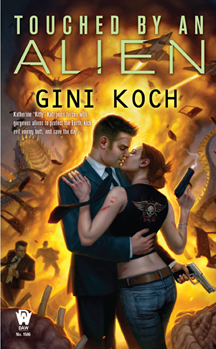
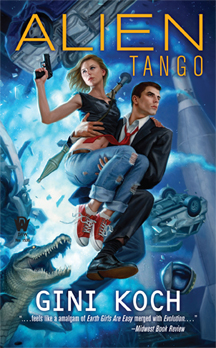
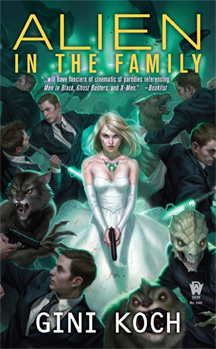
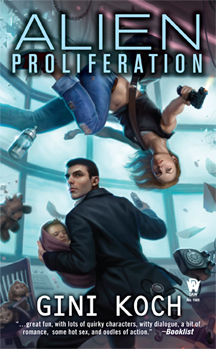
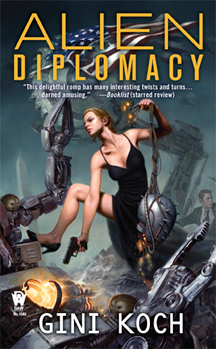
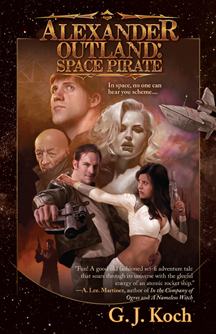
![]()
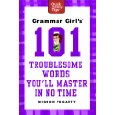










 in
in 